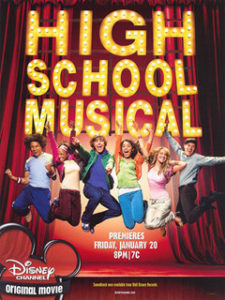Disney High School Musical China
歌舞青春
China, 2010, colour, 2.35:1, 91 mins.
Director: Chen Shizheng 陈士争.
Rating: 3/10.
Phoney cross-cultural concoction stripped of any plot and saddled with mostly lame musical numbers.
Shanghai, the present day. Studious Xiao Ningning (Ma Zihan) has just moved with her parents (Lu Zhong, Zhu Yaying) from Zhejiang province, where they run a crayfish business, so she can attend the prestigious Oriental International School. On her first day she outperforms all the other students in her class and attracts the attention of handsome fellow student Poet (Zhang Junning), who’s also a musician and songwriter, as well as his slacker friends Kebi (Yuan Chengjie) and Skinny (Liu Yanchen). Poet invites her to a karaoke club, where the two seem to make natural singing partners. When the time comes to choose a performer to represent the school at an inter-college singing competition, jealous rich girl Yangyang (Gu Xuan) organises her own selection. Poet wants to sing with Xiao Ningning but she follows her parents’ wish that she concentrates on her studies. Poet is further disappointed when Yangyang’s cohort, Yuanyuan, spreads the rumour that Poet and Xiao Ningning are romantically involved. Then the day of the competition arrives.
REVIEW
Following Argentinian and Brazilian versions, China gets its very own film spin-off of the 2006 American TV movie – and, reflecting the bookends on its English title, Disney High  School Musical China 歌舞青春 (literally, “Singing and Dancing Youth”) is more Disney than China. Given its disastrous performance at the Mainland box office this summer [2010, grossing an invisible RMB1.1 million], it’s a reasonable guess there won’t be a DHSMC2; more likely, in years to come, the movie will be discussed by cinema historians – and even shown in lecture halls – as an example of Hollywood’s continuing inability to learn any lessons in cultural transplantation. Disney’s third Chinese production, after The Magic Gourd 宝葫芦的秘密 (2007) and Trail of the Panda 熊猫回家路 (2009), it looks good, sounds largely blah, and has a script that could best be described as non-existent.
School Musical China 歌舞青春 (literally, “Singing and Dancing Youth”) is more Disney than China. Given its disastrous performance at the Mainland box office this summer [2010, grossing an invisible RMB1.1 million], it’s a reasonable guess there won’t be a DHSMC2; more likely, in years to come, the movie will be discussed by cinema historians – and even shown in lecture halls – as an example of Hollywood’s continuing inability to learn any lessons in cultural transplantation. Disney’s third Chinese production, after The Magic Gourd 宝葫芦的秘密 (2007) and Trail of the Panda 熊猫回家路 (2009), it looks good, sounds largely blah, and has a script that could best be described as non-existent.
US-born veteran producer Yang Yanzi [Janet Yang] 杨燕子 and director Chen Shizheng 陈士争 – a Hunan-born, New York-based theatre/opera director who previously made the intellectual horror movie Dark Matter (2007), a US production with Meryl Streep and Liu Ye 刘烨 – have concocted a film that not only throws out about 90% of the original’s plotting but also appears to take place in two parallel worlds. The stripped-down story now plays like a skeleton (girl meets boy, girl and boy want to take part in a singing competition) that’s entirely kept afloat by the 12 musical numbers rather than any characterisation or drama inbetween. More problematically, it’s set in a kind of Grease-meets-Clueless universe peopled by Chinese aping American kids that only occasionally intersects with recognisable life in a modern Mainland city (Shanghai made to look as anonymous as possible). The aptly named Oriental International School could be any college in Middle America, but full of Mandarin-speaking students; meanwhile, their parents range from a hard-working crayfish-farming couple from Zhejiang to a very northern father who exhorts traditional Chinese culture (crosstalk comic Guo Degang 郭德纲 in a song cameo).
Culturally, none of this even bears thinking about, but it wouldn’t matter if the film worked as a musical. Unfortunately, both the choreography by former Madonna dancer Ruthy Inchaustegui and the songs (by various composers from China, Hong Kong, the US and South Korea) are equally bland. Only three songs are half-memorable: the ballad Rainy Season 梅雨季 for the two leads, which is the first that seems to be authentically from a Chinese youth musical after an hour of pseudo hip-hop and rap; the glitzy Perfection 完美 for the college rich-bitch; and the climactic I Can Fly 我飞故我在, by Hong Kongers Jin Peida 金培达 [Peter Kam] and Chen Shaoqi 陈少琪, which doesn’t quite succeed at being an anthemnal, uplifting ballad. Director Chen Shizheng and Hong Kong d.p. Chen Zhiying 陈志英 (Merry-Go-Round 初恋嗱喳面, 2001; Koma 救命, 2004) create some imaginative visual compositions, but they are underpinned by nothing happening dramatically.
The cast, among which pop singer Zhang Junning 张峻宁, 25, is the only member with a prior name, goes through the motions mechanically, with no script to work from. Zhang is likeable to an extent; as the rich-bitch, dance-trained Gu Xuan 顾璇, 23, tries very hard but looks too nice; and as the goody-two-shoes heroine, Ma Zihan 马梓涵, 22, has a sunny smile but not much else. As exercises in musical cross-culturalism, Kung Fu Hip Hop 精舞门 (2008) and even its sequel, Kung Fu Hip-Hop 2 精舞门2 (2010), are looking better all the time.
CREDITS
Presented by Shanghai Television Media (CN), Huayi Brothers Media (CN), Disney HSM China Productions (CN). Produced by Shanghai Television Media (CN), Huayi Brothers Media (CN), Disney HSM China Productions (CN).
Script: Li Lin. Story: Chen Shizheng. Teleplay: Peter Barsocchini. Photography: Chen Zhiying. Editing: Lin An’er [Angie Lam]. Background music: Zhao Zengxi [Chiu Tsang-hei], Zhang Renjie. Art direction: Li Yue. Costume design: Xu Jianshu [Lawrence Xu], Liu Guiqin. Sound: Christopher Paul Sheldon, Liu Yang. Visual effects: Xing Xing Digital. Choreography: Ruthy Inchaustegui.
Cast: Zhang Junning (Shiren/Poet), Ma Zihan (Xiao Ningning), Yuan Chengjie (Kebi/Kobe), Gu Xuan (Yangyang), Liu Yanchen (Shou Hou/Skinny), Lin Qi (Yuanyuan), Guo Degang (Kebi’s father), Sun Nan (Lv, maths teacher), Lu Zhong (Xiao Ningning’s father), Zhu Yaying (Xiao Ningning’s mother), Yang Tao (Kebi’s mother), Yang Kanwei (Yangyang’s father), Hu Qingyun (Yangyang’s mother), Li Qinqin (teacher), Zhang Wen (Qiuqiu, teacher), Tong Tong (Lan, sports mistress), Wang Wei (MC), Bao Xiaosong, Li Quan, Zhu Hua (competition judges), Xia Zhen, Zhang Yongxue, Yan Li, Yan Hua, Ren Keke, Tao Yuanyuan, Yuan Min, Chen Zhu, Zhao Xin, Chen Jiaojiao, Wu Li, Yang Chao, Wang Zhenwei, Deng Ning, Zhao Yan, Liu Longlong, Pan Xiaolong, Xu Shun, Zhang Yunhua, Ding Keqiang (students).
Release: China, 10 Aug 2010.
(Review originally published on Film Business Asia, 29 Dec 2010.)
